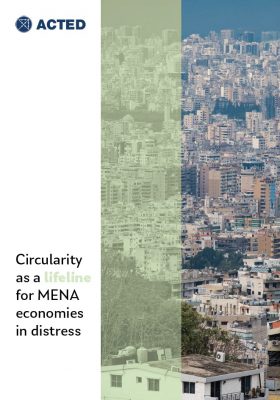Over the past months, currency devaluation has reached record levels in Yemen, Lebanon, Syria and more recently Iraq.
This currency crisis is the outcome of series of dramatic upheavals which have fallen upon the shoulders of communities across the MENA region over the past decade. The onset of the COVID pandemic comes as a devastating blow on top of the persistent economic issues endemic to the region: continued instability and conflict, high youth unemployment, stalled governance and economic reforms, resulting in highly fragmented social, economic and governance systems.
The response to such a challenge has to be innovative and ambitious in scope and mobilize actors at every level of society.
In this context, ACTED is implementing large scale programs to address the most pressing needs of the significant proportion of the population which has fallen into poverty, estimated by the ILO to represent an additional 14.3 million people.
Through the implementation of these programs and a desk review of regional and technical research, ACTED has developed a range of lessons learned and policy recommendations that highlight unique opportunities for circular economy and circular resource management strategies to catalyze the region’s economic recovery.
Please click here for access to our latest policy and program brief entitled ‘Circularity as a lifeline for MENA economies in distress’
Circularity as a lifeline for MENA economies in distress
Download
ACTED’s recommendations include:
- Focusing economic recovery on agriculture, manufacturing and construction sectors, for which the most substantial value can be gained through circular approaches
- Promoting a rational shift in prioritization of imports and investing in local production, as well as encouraging additional value extraction from available materials through supporting repair and reuse market actors Capitalize on the unique opportunity to expand collection and valorization of specialized waste streams which can replace imports or than can be exported at profit Raising awareness among local actors of the potential benefits of circular economy approaches and mobilizing groups across society to push for the necessary policy reforms
- Promoting South-South cooperation and knowledge exchange between governments, civil society, research institutions and the private sector to ensure lessons learned and successes

The policy and program brief relies on regional and country specific research, technical resources as well as feedback from ACTED’s program beneficiaries and key local stakeholders to outline specific prescriptive measures to be adopted as part of an economic recovery response.
While environmental preservation is often deprioritized or considered as non-essential in times of dire economic crisis, this briefing serves to highlight how the current context of sharp economic decline in MENA has triggered numerous unique opportunities for promoting a circular economy and circular resource management which could have catalytic effects in economic recovery. In these contexts, circular approaches have the potential to stimulate job creation, increase value extraction, increase productivity, reduce government expenditures and improve access.